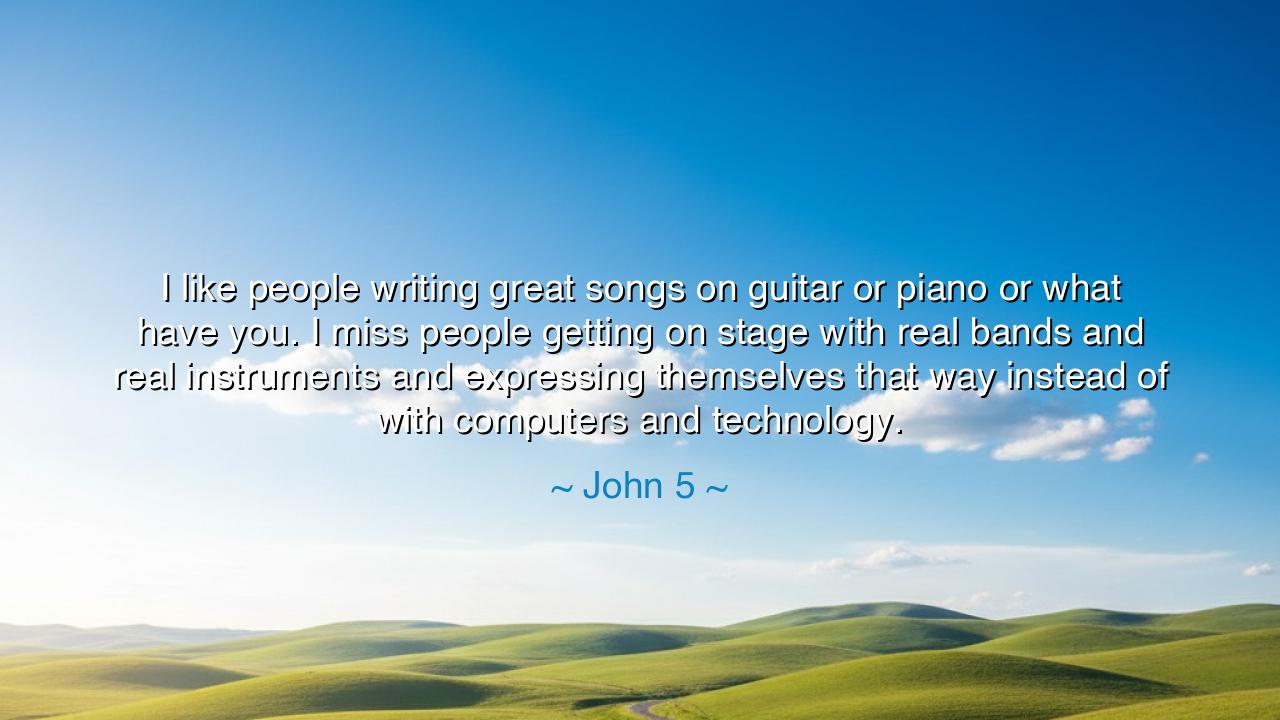
I like people writing great songs on guitar or piano or what have
I like people writing great songs on guitar or piano or what have you. I miss people getting on stage with real bands and real instruments and expressing themselves that way instead of with computers and technology.






The words of John 5 — “I like people writing great songs on guitar or piano or what have you. I miss people getting on stage with real bands and real instruments and expressing themselves that way instead of with computers and technology.” — are not merely the lament of a musician; they are the cry of a soul yearning for authenticity in an age of imitation. In these words, there resounds the timeless truth that art is born from human touch, from the sweat, breath, and imperfection that machines can only mimic but never feel. His longing is not for nostalgia’s sake, but for the preservation of the sacred bond between creator and creation — the living pulse of music that flows from the heart, not the circuit.
In the ancient times, the sages spoke of the sacred fire of craftsmanship, the divine spark that turns labor into art. The sculptor’s chisel, the poet’s quill, the musician’s string — these were seen not as tools, but as extensions of the soul. The great philosopher Aristotle once said that art imitates life, but in John 5’s reflection, we hear a warning: that imitation without feeling becomes hollow. He reminds us that when the hand no longer trembles upon the string, when the breath no longer shapes the note, when creation is replaced by automation — the spirit of music begins to fade.
The origin of this quote lies in the heart of a man who has lived his life surrounded by both mastery and machinery. As one of the world’s most respected guitarists, John 5 has played beside legends, his fingers weaving melodies that bridge metal, country, and classical styles. Yet, in the digital age, he has watched as music — once raw and human — has become filtered through screens and algorithms. He speaks not as a critic of progress, but as a guardian of truth: that while technology can amplify sound, it cannot replicate emotion. A guitar string hums not only with vibration, but with the history of every hand that has ever played it.
Consider the story of Ludwig van Beethoven, who composed his symphonies as his hearing faded into silence. He could not rely on machines or tools — only on the memory of sound, the rhythm of his heartbeat, and the echo of his soul. When he struck the final chords of his Ninth Symphony, he heard nothing, yet the audience wept. That is the power of authenticity — creation born from struggle, imperfection, and humanity. John 5’s words call us back to that kind of creation: to music that breathes, that aches, that stumbles — and therefore lives.
His lament is not rejection, but yearning. He does not curse computers, but mourns how easily they have replaced expression with convenience. In every era, technology has sought to simplify art, but true artistry resists simplification. The brushstroke that trembles, the note that falters, the voice that cracks — these are the signs of life. Perfection belongs to machines; beauty belongs to humans. John 5 reminds us that when we trade the living for the lifeless, we gain precision but lose poetry. The stage without sweat is an altar without worship.
Yet within his words lies not despair, but hope — a call to arms for the next generation of creators. He asks us to return, not to the past, but to the essence of art: connection. To feel the weight of an instrument in one’s hands, to struggle through imperfection, to discover one’s truth through sound. For when an artist touches an instrument, the instrument touches back — it teaches humility, patience, and the sacred rhythm of persistence. No screen can offer that communion.
So, my children of this digital age, remember this: do not let technology replace your humanity. Let it assist you, but never let it command your art. Learn to create not for applause, but for expression; not for perfection, but for meaning. Sit before the instrument of your choice — guitar, piano, or voice — and let your heart speak, unedited and unfiltered. For the world needs not more noise, but more truth.
Thus, John 5’s words shall stand as a timeless reminder — that art is not in the machine, but in the maker. The string, the key, the drum, the voice — these are the bridges between the mortal and the divine. Cherish them. Keep them alive. For when music is born from the touch of human hands, it carries within it the breath of eternity — the proof that though machines may imitate creation, only humanity can make it sing.






AAdministratorAdministrator
Welcome, honored guests. Please leave a comment, we will respond soon